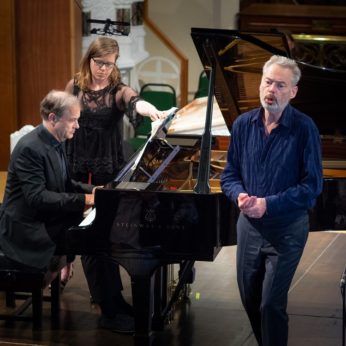Composer: Franz Schubert (b. 1797 - d. 1828)
Performance date: 03/07/2018
Venue: St. Brendan’s Church
Composition Year: 1797 - 1828
Duration: 00:55:55
Recording Engineer: Ciaran Cullen, RTÉ
Instrumentation: T-solo, pf
Instrumentation Category:Duo
Artists:
Mark Padmore -
[tenor]
Julius Drake -
[piano]

Mark Padmore [tenor], Julius Drake [piano]
Franz Schubert [1797-1828]
Schwanengesang D.957
1. Liebesbotschaft [Rellstab]
2. Kriegers Ahnung [Rellstab]
3. Frühlingssehnsucht [Rellstab]
4. Ständchen [Rellstab]
5. Aufenthalt [Rellstab]
6. In der Ferne [Rellstab]
7. Abschied [Rellstab]
8. Der Atlas [Heine]
9. Ihr Bild [Heine]
10. Das Fischermädchen [Heine]
11. Die Stadt [Heine]
12. Am Meer [Heine]
13. Der Doppelgänger [Heine]
14. Die Taubenpost [Seidl]
The Viennese publisher, Tobias Haslinger, has had a bad press over the years. After Schubert’s death he collected fourteen of his last Lieder and published them together under the romantically suggestive title, Schwanengesang [Swansong}. The point here is that there is no musically unifying thread as there is in Die Schöne Müllerin and Winterreise and the songs do not narrate a continuous tale. In Schubert’s manuscript there are two collections dated August 1828: one of seven settings of poems by Ludwig Rellstab [1799-1860] and the other of six by Heinrich Heine [1797-1856]. This made thirteen so it may be that superstition joined forces with sentimentality to include Die Taubenpost by Johann Seidl, which was the last Lied that Schubert composed. Despite Haslinger, this disparate group of songs only became a de facto cycle with the advent of the recording industry. It is now regularly performed as a cycle and to great effect, so it seems churlish to complain about its dubious origin.
The Rellstab lyrics tell of a lover separated from his love, who, urged forward by restlessness, is only in the final song Abschied able to face the future with high spirits. Three of the first four songs are amongst Schubert’s most sensual love lyrics. Liebesbotschaft, with its deliciously rippling accompaniment, harks back to the water music of Die Schöne Müllerin, while Frühlingssehnsucht has a breathless ardour, stilled for an instant by the hesitant questioning at the end of each stanza. Ständchen is Schubert’s most bewitching and perfectly shaped serenade with its uninhibitedly erotic atmosphere. All three are strophic settings with a difference, either with subtle key changes designed to foil the listener’s expectations or sudden, urgent changes of tempo. Three of the Rellstab songs are predominantly gloomy in tone. Kriegers Ahnung is kin to Schubert’s early episodic ballads, though it is far more concise and cohesive than they were; the return of the menacing drum beat at the very end makes for a grim and ironic conclusion. Aufenthalt and In der Ferne are both songs of romantic and tragic alienation. At the end of each, Schubert drives home the tragedy with vicious harmonic strokes. After this, the half-jaunty, half-wistful jog-trot of Abschied with its kaleidoscopically varied melodic line and its nonchalant key shifts comes as a physical relief.
The Heine texts are from a sequence of short lyrics called Die Heimkehr [The Homecoming]. The concentrated intensity of these songs immediately sets them off from the expansive Rellstab group. Der Atlas combines a strong muscular rhythm with a depth of sonority that exactly matches the depiction of Atlas with a world of sorrows on his shoulders. Ihr Bild is one of those flawless miniatures in which every note has its appointed place. There is a perfect formal balance in the three short verses, the outer pair strophically related and the central one following its own course. It creates its effect by juxtaposing bare octaves with eloquent phrases in four-part homophony, brilliantly capturing the two moods of aching loss and rapturous nostalgia. Das Fischermädchen is a barcarolle, the tripping 6/8 motion skimming the tops of the waves, buoyed up by the hope of love. Die Stadt is an impressionistic tone-poem fifty years before its time. The protagonist is being rowed across a lake from twilight to dawn, looking back at a town and remembering the love he lost there. Through most of the song Schubert holds a diminished seventh suspended in a harmonic vacuum, an impressionist technique we thought was discovered by Debussy. The tremolando comes into its own in Am Meer. Schubert uses it as a way to promote sonority and the illusion of action at a very slow tempo, both crescendo and diminuendo also take on a vivid new dimension.
Der Doppelgänger is the most disturbing song of the set with its free declamation over an ominous ground bass with strange prophetic harmonies. In Schubert’s quest for atmosphere, suspense and drama, there is no melody, just slow-moving block chords with no figuration, while the voice declaims its hallucinatory tale before reaching for the three shattering climaxes, each more heartrending than the last. The piano postlude is extraordinary. Schubert’s very last song is a simple love-song with a catchy syncopated accompaniment, deft, side-slipping modulations and surely a hint of the pigeon’s wings?
Francis Humphrys
Copyright © 2024 West Cork Music. All rights reserved.
Designed and developed by Matrix Internet